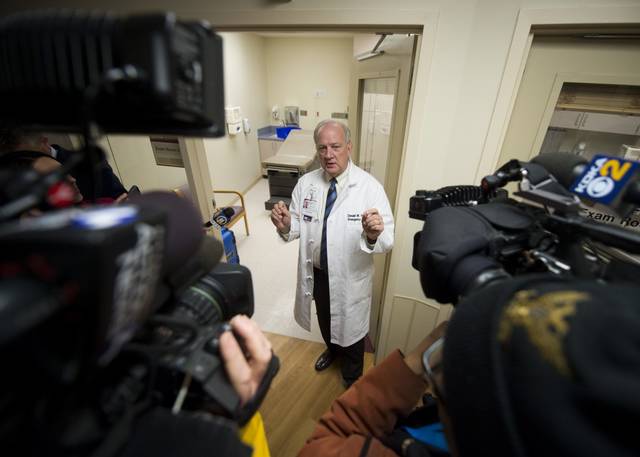https://triblive.com/local/pittsburgh-allegheny/upmc-doctor-on-coronavirus-fear-can-be-a-very-healthy-thing/
UPMC doctor on coronavirus: ‘Fear can be a very healthy thing’

The fear and anxiety that is gripping the nation as coronavirus cases soar is not necessarily a bad thing, a top UPMC doctor leading preparations at the Pittsburgh-based health giant said Thursday.
“Fear can be a very healthy thing,” Dr. Don Yealy, UPMC’s chair of emergency medicine, told the Tribune-Review. “It helps focus your attention on what you need to know or what you need to do.”
Yealy, 60, has emerged as a voice of reassurance as the region refines its plans for a potential onslaught of sick patients. With a career spanning 35 years, Yealy has made appearances on CNN and other national networks without shying away from tough questions. When UPMC disclosed its own in-house test for the virus, Yealy called the federal testing capabilities delayed and limited.
The emerging pandemic – and the uncertainty that comes with it — is exactly what he trained for, he said.
“This is why we went into the field that we chose, the vocation,” said Yealy of Upper St. Clair. “While it’s demanding at times, it’s exactly the life I chose.”
UPMC hospitals, he said, have not experienced a surge in patients in its emergency departments with symptoms of covid-19, the disease caused by coronavirus. On Thursday, cases statewide shot up 39% to 185, including the first two confirmed in Westmoreland County. There have been 18 confirmed cases in Allegheny County, according to the state health department.
“The emergency department volume at UPMC has diminished,” Yealy said. “Most of our visits in the emergency department right now aren’t related to covid-19 or even an infectious concern.”
Instead, the patient population mirrors that of two months ago, when people were coming into emergency rooms with chest pain, trauma and stroke symptoms, he said.
“People still have concerns about ‘am I having a heart attack,’ ‘am I having a stroke,’ ‘did I hurt a particular bone in my body,’” he said.
Despite reports showing that hospitals in the United States are unprepared for the pandemic, Yealy said that’s not the case in the Pittsburgh region. Hospitals in Seattle, the epicenter of the outbreak in the U.S., have been overwhelmed with reduced supplies of equipment such as gloves and protective masks. Federal officials this week urged health care workers to switch from respirator face masks to looser surgical ones in an attempt to stave off a potential shortage of protective gear.
While there is an adequate supply of gear at UPMC, Yealy said workers are being encouraged to think twice before they use the equipment.
“We want to be smart about using the protective equipment such that we don’t go through it so quickly and in three weeks or in two months from now challenges begin to emerge,” he said. “Right now, while there are covid-19 infected patients in Western Pennsylvania and some in the hospitals, there is not an exceptionally high demand in the inpatient setting,” he said.
Doctors at UPMC are paying close attention to the geographic progression of the virus. They are studying cases in Italy, where the death toll has surpassed China’s. The country reported Thursday it reached 3,405 deaths, including an average of more than 350 daily deaths since March 15, according to the World Health Organization.
“Even in Italy, you have a fairly dense outbreak in one region, and it’s not that it’s absent anywhere else, but the intensity of the outbreak is different,” Yealy said. “We don’t fully understand why that is so I wouldn’t be able to predict what it will look like in Pittsburgh in three weeks or three months.”
Yealy said his dual role as emergency chair and doctor – including one day a week seeing patients at UPMC Presby in Oakland – has benefited from the experience gained during prior infectious disease outbreaks, including the 2009 outbreak of H1N1, known as swine flu.
UPMC began preparing in January, when the threat of an outbreak still appeared distant.
“Even some things like how we responded to Tree of Life can apply here,” he said, referring to the October 2018 synagogue shooting in Squirrel Hill. “The principles behind that apply…how did you prepare? How did you mobilize the plans that you put together? What decisions did you make?”
He said he is confident Western Pennsylvania will get through the crisis.
“I don’t think that this will go away quickly but we will respond to the challenge,” he said.
Copyright ©2026— Trib Total Media, LLC (TribLIVE.com)
